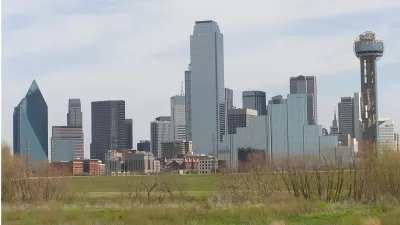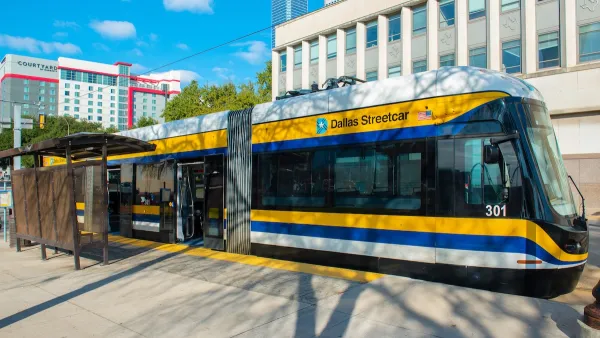In Dallas poorer people often rely on transit, a familiar pattern throughout the United States. But when car ownership grants access to opportunity, this can be a problem.

In car-friendly Dallas, poverty often means lack of access to the dominant form of transportation. Brandon Formby reports on the conditions people like Artis Frnak face daily. From the article: "A car could provide faster access to a better job, but loan payments, maintenance and insurance would eat away at salary gains. So it makes more financial sense to Frank to live near a DART bus line and find work close to public transit."
"That's how life goes along the poverty line in car-centric cities like Dallas, whose 20th-century growth birthed highways that became developmental skeletons for suburbs where the middle class have fled for decades. Left behind is an urban core with housing and socioeconomic problems — and infrastructure built for cars that many poor people can't afford."
For many poor city-dwellers, a car is prerequisite to advancement. "[Resident] Gaddis' car isn't about getting around quicker in the life she has, though. It's about improving her job prospects. She plans to enroll at Remington College in Garland so she can be a medical assistant. Using public transit to juggle education, child care and work would be too cumbersome."
The city's Neighborhoods Plus development report [pdf] outlines its current efforts to address these disparities. The Neighborhoods Plus plan will approach transit planning by gathering data on individual area needs. The goal is to make multiple mobility options available to residents.
FULL STORY: Stemming poverty in Dallas requires rethinking mobility

Planetizen Federal Action Tracker
A weekly monitor of how Trump’s orders and actions are impacting planners and planning in America.

Map: Where Senate Republicans Want to Sell Your Public Lands
For public land advocates, the Senate Republicans’ proposal to sell millions of acres of public land in the West is “the biggest fight of their careers.”

Restaurant Patios Were a Pandemic Win — Why Were They so Hard to Keep?
Social distancing requirements and changes in travel patterns prompted cities to pilot new uses for street and sidewalk space. Then it got complicated.

Platform Pilsner: Vancouver Transit Agency Releases... a Beer?
TransLink will receive a portion of every sale of the four-pack.

Toronto Weighs Cheaper Transit, Parking Hikes for Major Events
Special event rates would take effect during large festivals, sports games and concerts to ‘discourage driving, manage congestion and free up space for transit.”

Berlin to Consider Car-Free Zone Larger Than Manhattan
The area bound by the 22-mile Ringbahn would still allow 12 uses of a private automobile per year per person, and several other exemptions.
Urban Design for Planners 1: Software Tools
This six-course series explores essential urban design concepts using open source software and equips planners with the tools they need to participate fully in the urban design process.
Planning for Universal Design
Learn the tools for implementing Universal Design in planning regulations.
Heyer Gruel & Associates PA
JM Goldson LLC
Custer County Colorado
City of Camden Redevelopment Agency
City of Astoria
Transportation Research & Education Center (TREC) at Portland State University
Camden Redevelopment Agency
City of Claremont
Municipality of Princeton (NJ)





























